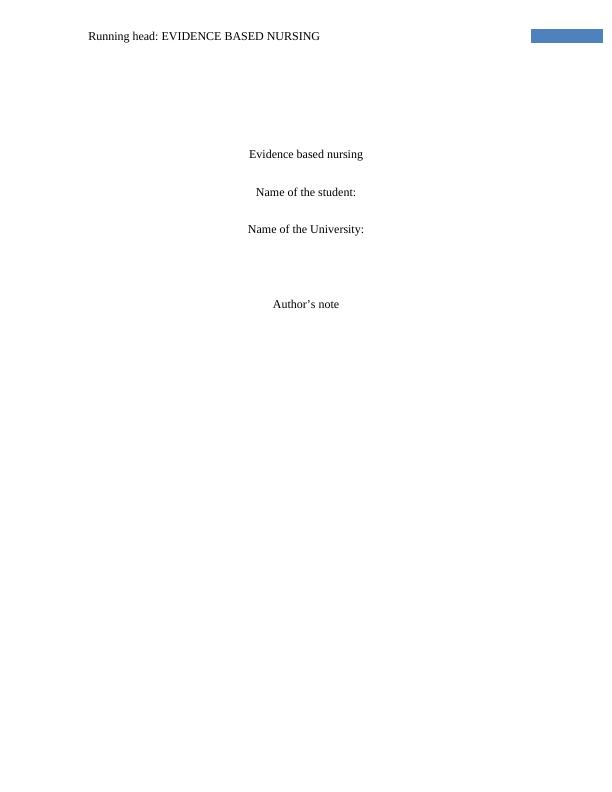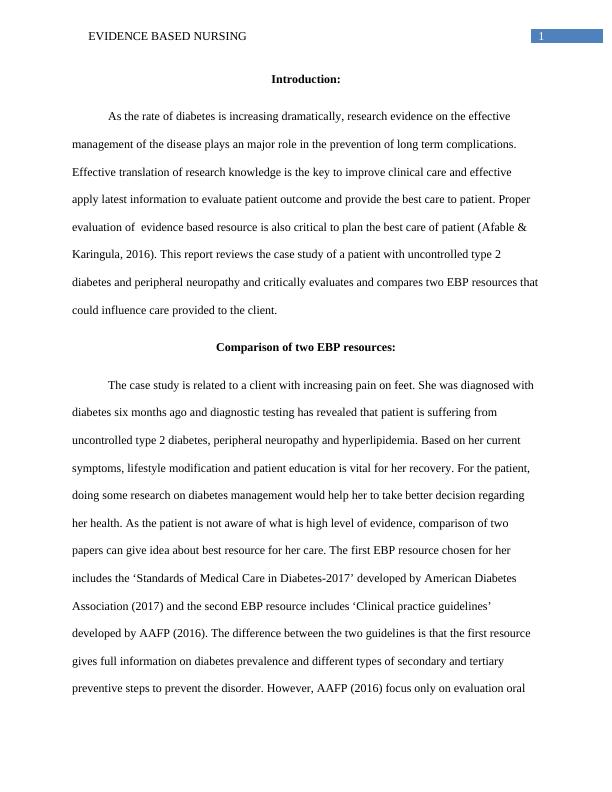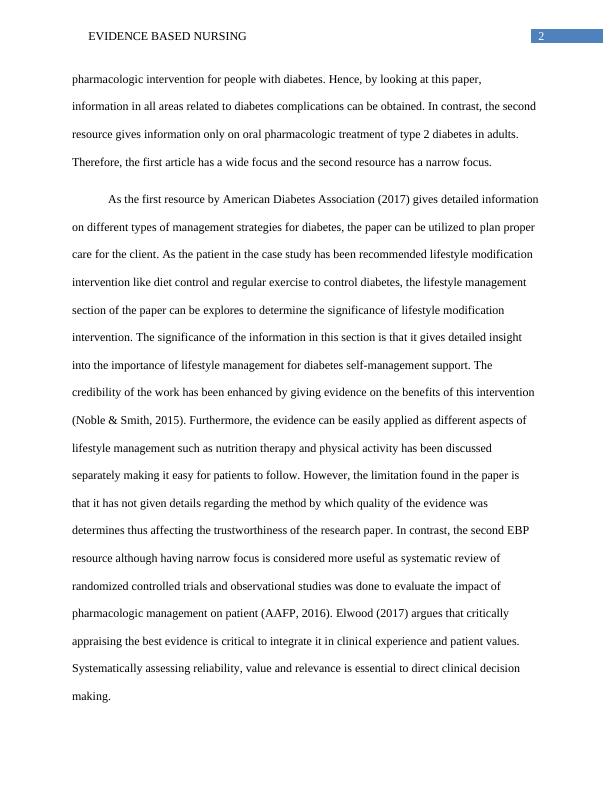Effective Diabetes Management: Comparing Evidence-Based Resources for Better Patient Care
Added on 2023-04-25
8 Pages1743 Words267 Views
Running head: EVIDENCE BASED NURSING
Evidence based nursing
Name of the student:
Name of the University:
Author’s note
Evidence based nursing
Name of the student:
Name of the University:
Author’s note

1EVIDENCE BASED NURSING
Introduction:
As the rate of diabetes is increasing dramatically, research evidence on the effective
management of the disease plays an major role in the prevention of long term complications.
Effective translation of research knowledge is the key to improve clinical care and effective
apply latest information to evaluate patient outcome and provide the best care to patient. Proper
evaluation of evidence based resource is also critical to plan the best care of patient (Afable &
Karingula, 2016). This report reviews the case study of a patient with uncontrolled type 2
diabetes and peripheral neuropathy and critically evaluates and compares two EBP resources that
could influence care provided to the client.
Comparison of two EBP resources:
The case study is related to a client with increasing pain on feet. She was diagnosed with
diabetes six months ago and diagnostic testing has revealed that patient is suffering from
uncontrolled type 2 diabetes, peripheral neuropathy and hyperlipidemia. Based on her current
symptoms, lifestyle modification and patient education is vital for her recovery. For the patient,
doing some research on diabetes management would help her to take better decision regarding
her health. As the patient is not aware of what is high level of evidence, comparison of two
papers can give idea about best resource for her care. The first EBP resource chosen for her
includes the ‘Standards of Medical Care in Diabetes-2017’ developed by American Diabetes
Association (2017) and the second EBP resource includes ‘Clinical practice guidelines’
developed by AAFP (2016). The difference between the two guidelines is that the first resource
gives full information on diabetes prevalence and different types of secondary and tertiary
preventive steps to prevent the disorder. However, AAFP (2016) focus only on evaluation oral
Introduction:
As the rate of diabetes is increasing dramatically, research evidence on the effective
management of the disease plays an major role in the prevention of long term complications.
Effective translation of research knowledge is the key to improve clinical care and effective
apply latest information to evaluate patient outcome and provide the best care to patient. Proper
evaluation of evidence based resource is also critical to plan the best care of patient (Afable &
Karingula, 2016). This report reviews the case study of a patient with uncontrolled type 2
diabetes and peripheral neuropathy and critically evaluates and compares two EBP resources that
could influence care provided to the client.
Comparison of two EBP resources:
The case study is related to a client with increasing pain on feet. She was diagnosed with
diabetes six months ago and diagnostic testing has revealed that patient is suffering from
uncontrolled type 2 diabetes, peripheral neuropathy and hyperlipidemia. Based on her current
symptoms, lifestyle modification and patient education is vital for her recovery. For the patient,
doing some research on diabetes management would help her to take better decision regarding
her health. As the patient is not aware of what is high level of evidence, comparison of two
papers can give idea about best resource for her care. The first EBP resource chosen for her
includes the ‘Standards of Medical Care in Diabetes-2017’ developed by American Diabetes
Association (2017) and the second EBP resource includes ‘Clinical practice guidelines’
developed by AAFP (2016). The difference between the two guidelines is that the first resource
gives full information on diabetes prevalence and different types of secondary and tertiary
preventive steps to prevent the disorder. However, AAFP (2016) focus only on evaluation oral

2EVIDENCE BASED NURSING
pharmacologic intervention for people with diabetes. Hence, by looking at this paper,
information in all areas related to diabetes complications can be obtained. In contrast, the second
resource gives information only on oral pharmacologic treatment of type 2 diabetes in adults.
Therefore, the first article has a wide focus and the second resource has a narrow focus.
As the first resource by American Diabetes Association (2017) gives detailed information
on different types of management strategies for diabetes, the paper can be utilized to plan proper
care for the client. As the patient in the case study has been recommended lifestyle modification
intervention like diet control and regular exercise to control diabetes, the lifestyle management
section of the paper can be explores to determine the significance of lifestyle modification
intervention. The significance of the information in this section is that it gives detailed insight
into the importance of lifestyle management for diabetes self-management support. The
credibility of the work has been enhanced by giving evidence on the benefits of this intervention
(Noble & Smith, 2015). Furthermore, the evidence can be easily applied as different aspects of
lifestyle management such as nutrition therapy and physical activity has been discussed
separately making it easy for patients to follow. However, the limitation found in the paper is
that it has not given details regarding the method by which quality of the evidence was
determines thus affecting the trustworthiness of the research paper. In contrast, the second EBP
resource although having narrow focus is considered more useful as systematic review of
randomized controlled trials and observational studies was done to evaluate the impact of
pharmacologic management on patient (AAFP, 2016). Elwood (2017) argues that critically
appraising the best evidence is critical to integrate it in clinical experience and patient values.
Systematically assessing reliability, value and relevance is essential to direct clinical decision
making.
pharmacologic intervention for people with diabetes. Hence, by looking at this paper,
information in all areas related to diabetes complications can be obtained. In contrast, the second
resource gives information only on oral pharmacologic treatment of type 2 diabetes in adults.
Therefore, the first article has a wide focus and the second resource has a narrow focus.
As the first resource by American Diabetes Association (2017) gives detailed information
on different types of management strategies for diabetes, the paper can be utilized to plan proper
care for the client. As the patient in the case study has been recommended lifestyle modification
intervention like diet control and regular exercise to control diabetes, the lifestyle management
section of the paper can be explores to determine the significance of lifestyle modification
intervention. The significance of the information in this section is that it gives detailed insight
into the importance of lifestyle management for diabetes self-management support. The
credibility of the work has been enhanced by giving evidence on the benefits of this intervention
(Noble & Smith, 2015). Furthermore, the evidence can be easily applied as different aspects of
lifestyle management such as nutrition therapy and physical activity has been discussed
separately making it easy for patients to follow. However, the limitation found in the paper is
that it has not given details regarding the method by which quality of the evidence was
determines thus affecting the trustworthiness of the research paper. In contrast, the second EBP
resource although having narrow focus is considered more useful as systematic review of
randomized controlled trials and observational studies was done to evaluate the impact of
pharmacologic management on patient (AAFP, 2016). Elwood (2017) argues that critically
appraising the best evidence is critical to integrate it in clinical experience and patient values.
Systematically assessing reliability, value and relevance is essential to direct clinical decision
making.

End of preview
Want to access all the pages? Upload your documents or become a member.
Related Documents
Diseas Process and Management Assessment 2022lg...
|4
|581
|12
HLTEN512B – Implement and Monitor Nursing Care for Clientslg...
|8
|2197
|115
Nursing Case Study: Pathophysiology, Nursing Priorities, and Managementlg...
|13
|3628
|69
Diabetes Mellitus and Associated Pharmacological Treatmentlg...
|4
|558
|460
Nursing Care Case Study : Assignmentlg...
|7
|1860
|37
Barriers and Enablers to Implementing Evidence-Based Practice in Nursinglg...
|6
|1200
|50
